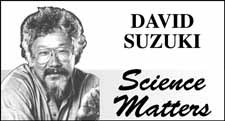When wading through the words of pundits and the babble of political posturing, I can't help but think of some of the simple truths we learned as children. Remember those stories from Aesop, Hans Christian Andersen, and the Grimm brothers that enthralled us while imparting powerful messages? Two childhood fables seem particularly important today.
Once upon a time, a couple owned a goose that laid a golden egg every day. They became very rich but were not content with a single egg a day. In their greed, they killed the goose to get at the eggs inside. Of course, they found the goose had guts like any other goose, and they ended up with nothing.
I thought of that story while working on a Nature of Things program on the destruction of the Amazon rainforest. In the 1980s, Brazil's government encouraged people to move to the Amazon to make a living or a fortune. "Land without people for people without land" was how the government promoted it.
And so one of the largest, most complex, and irreplaceable ecosystems on the planet has been logged, flooded, mined, and burned for decades as Brazilians seek their fabled El Dorado, the city of gold. But, as in the fairy tale about the goose, El Dorado is the forest, not the resources being exploited by destroying it.
Many see the destructive activities in South America as a response to poverty. If that's true, what's our excuse? In North America, we have demolished the bulk of our original forests through the unsustainable practice of clear-cut logging. Across the country, one logging community after another has gone from boom to bust as forests have been cut down. The golden eggs were the economic benefits of logging, which could have been obtained year after year, as long as the goose - the forest - was healthy.
Over and over, we find ourselves rushing to get more eggs. In doing so, we end up losing the goose. We do it in agriculture as we use up the topsoil created over millennia; we do it in fisheries as our increasing technological power allows us to catch more fish faster; and we do it in northern Alberta as we tear up boreal ecosystems, pollute the water, and inject massive amounts of greenhouse gas into the atmosphere, all to get more of those eggs. And damn the goose.
I thought of another children's tale while listening to the CBC's Peter Mansbridge interview Prime Minister Stephen Harper earlier this year. The prime minister claimed Canadians were only concerned about the economy and that Canada's possible involvement with torture in Afghanistan was not a serious concern. Mr. Harper also ignored the massive public demand for leadership on climate change that preceded Copenhagen. The tale that comes to mind is the story of the emperor who wore no clothes.
Long ago, a vain emperor was overly concerned about his appearance. Two crafty weavers promised to make him a fine outfit from material that could not be seen by those who were stupid or unfit for their position. When the weavers pretended to display samples, the emperor couldn't admit he was unable to see them, for that would be an admission of incompetence or stupidity. His courtiers and ministers were likewise unable to admit they saw nothing. When the weavers came with the finished outfit, everyone oohed and aahed. Putting on the imaginary clothes, the emperor paraded outside so the public could admire him and his new attire. Everyone in the crowd, enthralled by the status of the king and bowed by their desire to be seen as clever and fashionable, remained silent. Only a child, innocent of the claims of the weavers, pointed out the obvious: "The emperor has no clothes."
We are living in a time when ecological degradation is occurring everywhere. B.C.'s northern forests have turned red, victims of mountain pine beetles no longer killed by winters that have become too warm.
Farmers know harvest time is later, birders report birds migrating north two weeks earlier and departing weeks later than normal, competitive skiers tell us European meets are being cancelled for lack of snow.
Glaciers are receding, Arctic ice is melting the list is long. But where the emperor and his sycophantic subjects were blinded by vanity, we are prevented from seeing by the cloak of economics and politics.
Let's throw off the blinders and see the world as any child can.
Learn more at www.davidsuzuki.org.




